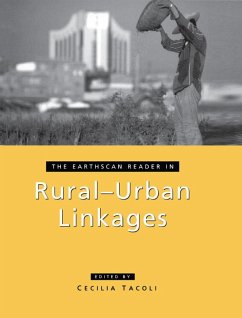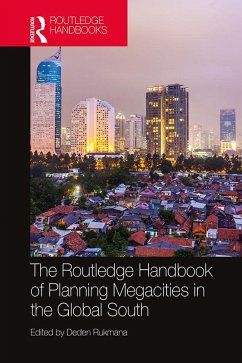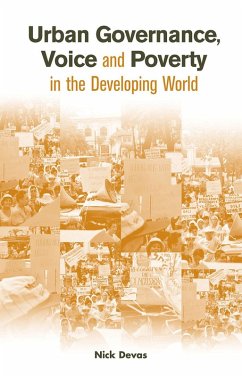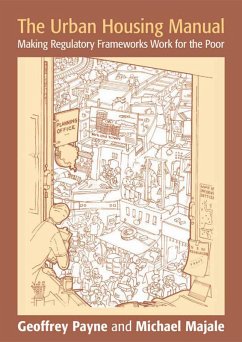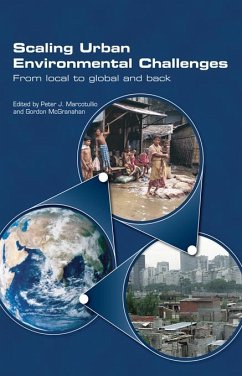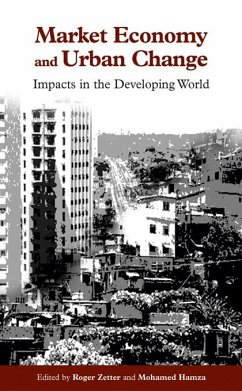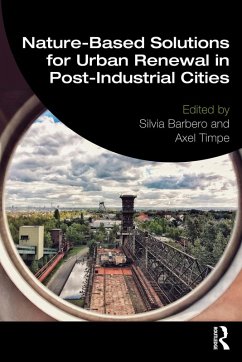
The Peri-Urban Interface (eBook, ePUB)
Approaches to Sustainable Natural and Human Resource Use
Redaktion: McGregor, Duncan; Thompson, Donald; Simon, David
Versandkostenfrei!
Sofort per Download lieferbar
45,95 €
inkl. MwSt.
Weitere Ausgaben:

PAYBACK Punkte
23 °P sammeln!
Peri-urban interfaces - the zones where urban and rural areas meet - suffer from the greatest problems to humans caused by rapid urbanization, including intense pressures on resources, slum formation, lack of adequate services such as water and sanitation, poor planning and degradation of farmland. These areas, home to hundreds of millions of people, face unique problems and need distinctive and innovative approaches and solutions.This book, authored by top researchers and practitioners, covers the full breadth and depth of the impacts of rapid urbanization on livelihoods, poverty and resource...
Peri-urban interfaces - the zones where urban and rural areas meet - suffer from the greatest problems to humans caused by rapid urbanization, including intense pressures on resources, slum formation, lack of adequate services such as water and sanitation, poor planning and degradation of farmland. These areas, home to hundreds of millions of people, face unique problems and need distinctive and innovative approaches and solutions.
This book, authored by top researchers and practitioners, covers the full breadth and depth of the impacts of rapid urbanization on livelihoods, poverty and resources in the peri-urban zones in diverse African, Asian, Latin American and Caribbean contexts. Topics include peri-urban resource sustainability, ecosystems and societies and environmental changes in peri-urban zones. Rich case studies cover production systems and livelihoods including the impacts of irrigated vegetable production, horticulture, dairy enterprises, waste-fed fisheries and pastoral livelihoods. Also addressed are planning and development issues in the peri-urban interface including the difficulty in achieving sustainability, conflict and cooperation over resources, and a fresh look at the relationship between people and their environment. The final part of the book presents policies and strategies for promoting and measuring sustainability in peri-urban zones including community-based waste management, the co-management of watersheds and empowerment of the poor.
This book is the most comprehensive examination of the challenges and solutions facing the people and environments of peri-urban zones and is essential reading for all practitioners, students and academics in geography and development.
This book, authored by top researchers and practitioners, covers the full breadth and depth of the impacts of rapid urbanization on livelihoods, poverty and resources in the peri-urban zones in diverse African, Asian, Latin American and Caribbean contexts. Topics include peri-urban resource sustainability, ecosystems and societies and environmental changes in peri-urban zones. Rich case studies cover production systems and livelihoods including the impacts of irrigated vegetable production, horticulture, dairy enterprises, waste-fed fisheries and pastoral livelihoods. Also addressed are planning and development issues in the peri-urban interface including the difficulty in achieving sustainability, conflict and cooperation over resources, and a fresh look at the relationship between people and their environment. The final part of the book presents policies and strategies for promoting and measuring sustainability in peri-urban zones including community-based waste management, the co-management of watersheds and empowerment of the poor.
This book is the most comprehensive examination of the challenges and solutions facing the people and environments of peri-urban zones and is essential reading for all practitioners, students and academics in geography and development.
Dieser Download kann aus rechtlichen Gründen nur mit Rechnungsadresse in A, B, BG, CY, CZ, D, DK, EW, E, FIN, F, GR, HR, H, IRL, I, LT, L, LR, M, NL, PL, P, R, S, SLO, SK ausgeliefert werden.




